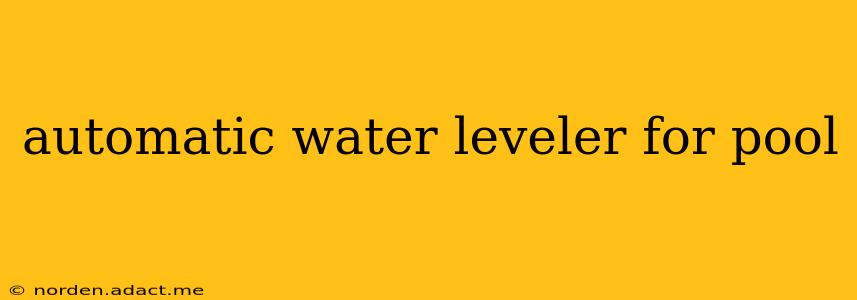Maintaining the perfect water level in your swimming pool is crucial for optimal functionality, safety, and aesthetics. Manually topping off your pool can be time-consuming and inconvenient. That's where automatic water levelers come in. These ingenious devices constantly monitor and adjust your pool's water level, ensuring it remains consistently full without your intervention. This comprehensive guide explores the benefits, types, installation, and maintenance of automatic pool water levelers.
What is an Automatic Pool Water Leveler?
An automatic pool water leveler is a device that automatically adds water to your pool when the level drops below a pre-set point. It eliminates the need for manual refilling, saving you time and effort while preventing potential problems associated with low water levels, such as pump damage or unsightly exposed plumbing. These systems typically utilize a float sensor, a water source connection (usually a garden hose), and a valve to control the water flow.
How Does an Automatic Pool Water Leveler Work?
Most automatic pool water levelers operate on a simple yet effective principle:
-
Level Sensing: A float sensor, similar to those found in toilet tanks, monitors the water level in your pool. This sensor is usually located within a protective housing near the pool's edge.
-
Level Trigger: When the water level drops below the predetermined minimum, the float sensor activates a control mechanism.
-
Water Supply Activation: This activation opens a valve, allowing water to flow from your designated water source (typically a garden hose or dedicated water line) into the pool.
-
Automatic Shut-Off: Once the water level reaches the desired level, the float sensor deactivates, closing the valve and stopping the water flow. This prevents overfilling.
Different Types of Automatic Pool Water Levelers
Several types of automatic pool water levelers exist, each with its own advantages and disadvantages:
-
Float-Based Systems: These are the most common type, relying on a float to sense the water level and activate the water supply. They are generally inexpensive and reliable.
-
Electronic Systems: These more sophisticated systems utilize electronic sensors and often incorporate features like remote monitoring and control. They tend to be more expensive but offer greater precision and control.
-
Pressure-Based Systems: These less common systems use pressure sensors to detect water level changes. They are generally less susceptible to debris interference but can be more complex to install.
What are the Benefits of Using an Automatic Pool Water Leveler?
The benefits of installing an automatic pool water leveler are numerous:
-
Convenience: Eliminate the chore of manually checking and refilling your pool.
-
Time Savings: Reclaim your valuable time, freeing you from this repetitive task.
-
Water Conservation: Prevents unnecessary water waste by only adding water when needed.
-
Protection Against Damage: Maintains optimal water levels, protecting your pool pump and other equipment from damage caused by low water levels.
-
Improved Aesthetics: Prevents unsightly exposed plumbing or skimmers when the water level is too low.
How Much Does an Automatic Pool Water Leveler Cost?
The cost of an automatic pool water leveler varies widely depending on the type, features, and brand. Expect to pay anywhere from a few hundred dollars to several thousand dollars for a high-end system with advanced features.
How Do I Install an Automatic Pool Water Leveler?
Installing an automatic pool water leveler may seem daunting but is generally a straightforward process. However, if you're not comfortable working with plumbing, it's best to hire a qualified pool professional. Consult the manufacturer's instructions for specific installation details for your chosen model. Generally, installation involves connecting the unit to a water source, mounting the float sensor, and connecting the valve to the pool's plumbing.
How Do I Maintain an Automatic Pool Water Leveler?
Regular maintenance ensures the longevity and efficiency of your automatic pool water leveler:
-
Check the Float: Periodically inspect the float to ensure it moves freely and is not obstructed by debris.
-
Clean the Sensor: Regularly clean the sensor to remove any algae or other buildup that could affect its accuracy.
-
Inspect the Valve: Ensure the valve operates smoothly and doesn't leak.
-
Check for Leaks: Regularly check the entire system for any leaks.
By investing in an automatic pool water leveler, you'll enjoy a more convenient, efficient, and worry-free pool ownership experience. Remember to choose a system that suits your needs and budget and to follow the manufacturer's instructions for installation and maintenance.
